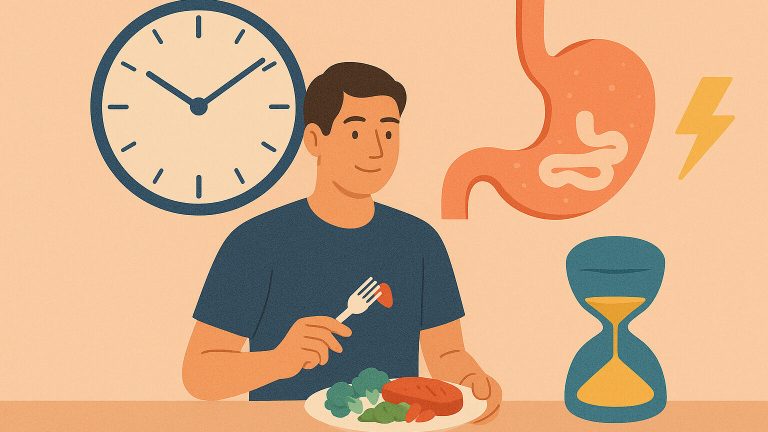Small changes in timing can shape how the body feels each day
Many people focus on what they eat, but often overlook when they eat. The timing of meals plays a quiet but steady role in how the body digests food and maintains energy. Eating at regular intervals can help support balanced blood sugar levels, improve mood, and reduce the risk of digestive discomfort. While the perfect schedule can vary, consistent meal timing helps the body know what to expect and when.
Skipping meals or eating too close together may leave some feeling sluggish or bloated. Others notice a dip in energy when they delay meals for too long. The body responds not only to food content, but also to patterns. Sticking to a schedule allows digestive organs to function more smoothly, preventing common issues like heartburn or energy crashes.
Daily rhythms are influenced by more than just sunlight and sleep. Hunger cues, energy spikes, and even mental focus are tied to meal patterns. When these patterns stay steady, the body has an easier time adapting to stress and maintaining its natural balance.
Supporting digestion with consistent rhythms
The digestive system works best when it follows a predictable flow. When meals are eaten at similar times each day, the body begins to prepare in advance. Stomach acid and enzymes begin to release ahead of time, making digestion smoother and more efficient. This leads to fewer issues like gas or bloating.
Think of it like arriving at a restaurant during its usual lunch hour—the staff is ready. But if you show up at a strange hour, the kitchen may not be prepped. The same goes for your digestive tract. When meals come at odd times, the system may not respond as quickly or comfortably.
People who eat on a regular schedule often report better bowel movements and fewer stomachaches. Their bodies get into a rhythm. This rhythm becomes a helpful background system that supports the rest of their day without drawing attention—just calm, steady digestion.
Morning meals set the tone for energy flow
Eating in the morning helps signal the start of the body’s activity cycle. After hours of rest, food provides the fuel to wake up the system and kickstart energy production. A balanced breakfast encourages mental clarity and steadier energy throughout the morning hours.
Those who skip this early meal often find themselves reaching for quick fixes—like caffeine or sugar—later in the day. That burst might help for a little while, but it usually comes with a crash. A morning meal with protein, fiber, and healthy fats can prevent this rollercoaster.
Even something simple like a boiled egg and whole grain toast can provide a gentle, sustaining start. The goal isn’t perfection, but regularity. Giving the body something to work with early in the day helps the mind stay focused and the stomach stay calm.
Midday timing and avoiding the afternoon slump
The middle of the day often comes with a dip in energy. For many people, this slump hits hardest when lunch is delayed or skipped. A timely lunch supports steady blood sugar levels and gives the brain the fuel it needs to stay alert through the afternoon.
When lunch is too heavy or too late, it may leave someone feeling slow or sleepy. Instead, eating a moderate meal that includes some fiber and protein helps avoid these issues. It also helps curb overeating later in the day when hunger builds up too much.
This balance isn’t just about what’s on the plate—it’s about when that plate hits the table. A consistent lunch window, ideally before 2 p.m., allows the body to digest properly and keep energy moving at a natural pace through the rest of the workday.
Dinner and the role of winding down digestion
Evening meals give the body a final opportunity to nourish itself before rest. Eating too late or too heavily can disrupt sleep and slow digestion. A light, early dinner gives the system time to break down food before bedtime, making it easier to sleep soundly and wake refreshed.
When dinner happens too close to bedtime, it may cause reflux or discomfort. The body needs time to complete digestion, and lying down too soon makes that harder. Finishing the last meal a few hours before bed supports deeper rest and more efficient overnight repair.
People who consistently eat dinner around the same time each night often feel more satisfied and less tempted to snack later. This helps prevent unwanted weight gain and supports steady hormone levels that control appetite and sleep quality.
Snacks and their impact on hunger and energy
Snacking has its place, especially when there are long gaps between meals. The key is timing and content. A well-placed snack can bridge the gap, keeping blood sugar stable and preventing energy dips that lead to overeating later.
Eating too frequently, however, may prevent the body from fully digesting meals. It can also interfere with hunger cues. The stomach needs time to empty before it’s truly ready for more food. Waiting for actual hunger, rather than eating out of habit or boredom, helps reset this cycle.
A small piece of fruit, a handful of nuts, or some plain yogurt can be enough to refuel between meals without overwhelming digestion. Snacks work best when they serve a clear purpose: gentle support between structured meals rather than constant grazing.
Late-night eating and its ripple effects
Eating late at night is common for shift workers or people with irregular schedules. But it often comes with drawbacks. The body’s metabolism tends to slow in the evening, making it harder to process large meals efficiently. This can lead to weight gain, poor sleep, and sluggish mornings.
Late-night meals can also confuse hunger hormones. Leptin and ghrelin—the hormones that help regulate fullness and hunger—follow a daily rhythm. Eating at the wrong times disrupts this rhythm, creating a cycle of nighttime eating and morning fatigue.
For those who do need something late, a light and simple snack works better than a full meal. Keeping food choices easy to digest—like a banana or a small serving of oatmeal—helps satisfy hunger without interfering with rest.
How stress and irregular timing connect
Stress affects how the body processes food. When meals are skipped or delayed due to stress, digestion slows. This can cause bloating, discomfort, or changes in appetite. Stress also triggers the release of cortisol, a hormone that can increase cravings for sugar and fat.
When people eat at irregular times, stress can become a double burden—physically and mentally. Their digestion suffers, and their energy feels unpredictable. Regular meals can act as anchors, creating structure and reducing some of the noise that stress brings.
Even during busy days, setting aside time for food helps shift the body out of survival mode and into a more relaxed state. A calm mealtime, even if brief, sends a signal that there’s time to slow down and reset. This improves both digestion and mood.
Building a schedule that supports daily life
There’s no one-size-fits-all schedule for meals. What matters most is finding a rhythm that matches your routine and feels sustainable. Some people prefer three meals a day. Others feel better with smaller, more frequent eating windows. The key is to keep it steady.
Consistency helps regulate hunger cues and makes digestion more predictable. It also builds trust with your body—meals arrive when expected, and the body adapts. This reduces anxiety around eating and improves satisfaction from each meal.
Meal planning doesn’t need to be strict or stressful. A simple outline—breakfast within an hour of waking, lunch around midday, dinner a few hours before sleep—can be enough. From there, snacks and portions can adjust based on activity and appetite.
Supporting long-term wellness with meal timing
Meal timing may not be as flashy as the latest food trend, but it holds long-term value. It supports smooth digestion, steady energy, and better mental clarity throughout the day. These small daily patterns build into habits that carry lasting health benefits.
People who eat regularly often feel more in tune with their hunger, more satisfied after meals, and less prone to energy crashes. They also tend to sleep better and feel more energized in the morning. These shifts don’t happen overnight—but they add up.
Making time for food and honoring the body’s rhythms is a quiet form of care. It doesn’t require special tools or programs—just attention, consistency, and a willingness to listen to what your body needs.




